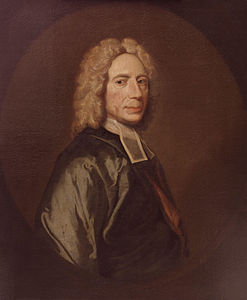Psalm 75
Isaac Watts 1674 (Southampton, Hampshire) – 1748 (Stoke Newington, Middlesex)
Power and government from God alone.
[Applied to the glorious Revolution by King William, or the happy accession of King George to the throne.]
To thee, most Holy and most High,
To thee we bring our thankful praise;
Thy works declare thy name is nigh,
Thy works of wonder and of grace.
Britain was doomed to be a slave,
Her frame dissolved, her fears were great;
When God a new supporter gave,
To bear the pillars of the state.
He from thy hand received his crown,
And sware to rule by wholesome laws;
His foot shall tread th' oppressor down,
His arm defend the righteous cause.
Let haughty sinners sink their pride,
Nor lift so high their scornful head;
But lay their foolish thoughts aside,
And own the king that God hath made.
Such honors never come by chance,
Nor do the winds promotion blow;
'Tis God the Judge doth one advance,
'Tis God that lays another low.
No vain pretence to royal birth
Shall fix a tyrant on the throne:
God, the great Sovereign of the earth,
Will rise and make his justice known.
[His hand holds out the dreadful cup
Of vengeance mixed with various plagues,
To make the wicked drink them up,
Wring out and taste the bitter dregs.
Now shall the Lord exalt the just;
And while he tramples on the proud,
And lays their glory in the dust,
My lips shall sing his praise aloud.]
Font size:
Submitted on May 13, 2011
Modified on March 11, 2023
- 1:13 min read
- 64 Views
Quick analysis:
| Scheme | AA BXBX CDCD EFEF GXGX HIHI JAJA KXKX LMLM |
|---|---|
| Closest metre | Iambic tetrameter |
| Characters | 1,276 |
| Words | 244 |
| Stanzas | 9 |
| Stanza Lengths | 2, 4, 4, 4, 4, 4, 4, 4, 4 |
Translation
Find a translation for this poem in other languages:
Select another language:
- - Select -
- 简体中文 (Chinese - Simplified)
- 繁體中文 (Chinese - Traditional)
- Español (Spanish)
- Esperanto (Esperanto)
- 日本語 (Japanese)
- Português (Portuguese)
- Deutsch (German)
- العربية (Arabic)
- Français (French)
- Русский (Russian)
- ಕನ್ನಡ (Kannada)
- 한국어 (Korean)
- עברית (Hebrew)
- Gaeilge (Irish)
- Українська (Ukrainian)
- اردو (Urdu)
- Magyar (Hungarian)
- मानक हिन्दी (Hindi)
- Indonesia (Indonesian)
- Italiano (Italian)
- தமிழ் (Tamil)
- Türkçe (Turkish)
- తెలుగు (Telugu)
- ภาษาไทย (Thai)
- Tiếng Việt (Vietnamese)
- Čeština (Czech)
- Polski (Polish)
- Bahasa Indonesia (Indonesian)
- Românește (Romanian)
- Nederlands (Dutch)
- Ελληνικά (Greek)
- Latinum (Latin)
- Svenska (Swedish)
- Dansk (Danish)
- Suomi (Finnish)
- فارسی (Persian)
- ייִדיש (Yiddish)
- հայերեն (Armenian)
- Norsk (Norwegian)
- English (English)
Citation
Use the citation below to add this poem to your bibliography:
Style:MLAChicagoAPA
"Psalm 75" Poetry.com. STANDS4 LLC, 2024. Web. 31 Oct. 2024. <https://www.poetry.com/poem/19814/psalm-75>.



Discuss the poem Psalm 75 with the community...
Report Comment
We're doing our best to make sure our content is useful, accurate and safe.
If by any chance you spot an inappropriate comment while navigating through our website please use this form to let us know, and we'll take care of it shortly.
Attachment
You need to be logged in to favorite.
Log In